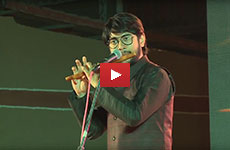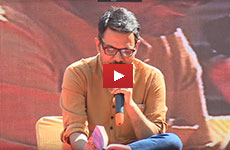


It’s incredible how social media has been able to bridge the gap between citizens and governance, society and social issues, victims and help, and service-seeker and service, among others. The power of social media is hard to dismiss today. What was once a platform to share photos with friends or follow celebrities has now also become a platform for accessing services, raising grievances and advocating for a cause. This is because social media has the power to connect and organise individuals and communities to disseminate information or views independently and in a free-flowing manner to billions of people, across different parts of the world, at an extremely fast pace and at no cost. Social media, in more than one way, adds to the democratic nature of a nation and strengthens it.
Digital Empowerment Foundation in partnership with the Friedrich Naumann Foundation (FNF) hosted the 4th Social Media for Empowerment Awards (SM4E) 2017 at India Habitat Centre, New Delhi, on April 29, 2017.
The Internet has become an increasingly powerful medium today to raise a debate, inform people about their rights person, create awareness on social issues, challenge stereotypes and change mindsets. We see a new hashtag every few weeks, trying to question a social, political or environmental evil. In so many cases, we have seen the power of crowd on social media forcing the authorities to take decisions to change laws, bring amendments and take cognisance of issues that they had perhaps been ignoring for far too long. Read More





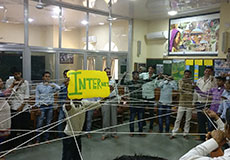
DEF in partnership with the Aga Khan Rural Support Programme (AKRSP) conducted a seven-day training on Functional IT Skills as part of a Certificate Course in Development Management in Netrang, Gujarat, from March 29 – April 5, 2017. The training was attended by 31 tribal youth from remote villages of Gujarat and Madhya Pradesh; 50 per cent of whom had never used a computer before or were first-time Internet users. To facilitate interactive learning, the training involved hands-on activities, games, quizzes and engaging experiments to teach individuals how to operate Microsoft Office tools and mobile phone applications. Read More
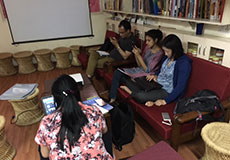
Access to information and communication was never as dynamic as it is in the age of social media today. This access is bringing about a monumental change in many spheres of our lives, especially governance. Bhutan is a country that is rooted in culture and tradition. But they have also come to acknowledge the importance of technology, especially social media, as a way forward. Hence, the Bhutanese government is undertaking various initiatives to become efficient in the use of technology. A social media workshop for Bhutanese officials in New Delhi from April 26 - 29, 2017 was one such initiative. Read More
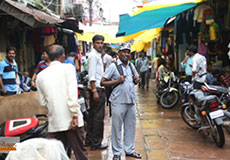
Muzaffar Ansari, more popularly known as Kalle Bhai, is a man of many stories and mysteries. A Class VI dropout, Kalle Bhai pursued his passion for history and heritage to become a tourist guide, an explorer and a man who can speak and write in six different languages. Kalle Bhai is a calligrapher, historian, photographer, author, traveller, tourist guide, weaver and numismatic. Last year, DEF had written a blog about this inspiring and interesting man in The Better India, following which he received an invite from TEDx Pune where he shared his life story and how lack of formal education was never a barrier for him. You can watch his Tedx Talk here.
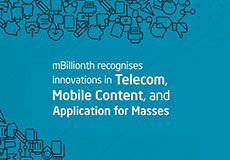
mBillionth Awards South Asia is the most influential and leading platform to explore, recognise and honour excellence in mobile innovations, applications and content services for development and empowerment across South Asia. The 8th edition of the mBillionth Awards has been launched, and we invite the minds behind creative mobile innovations to come forward and submit their nomination by May 15, 2017. Interested candidates can submit their application here or download the offline application from the website. For queries, reach out to the mBillionth Awards Secretariat at +91-11-26532786 or write to mbillionth@defindia.net.

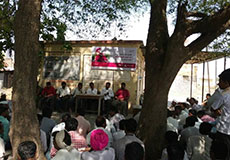
Every year, millions of people around the world transition out of poverty in a number of ways through access to better opportunities or fall back into poverty due to health, financial and other setbacks. Compounding this situation is the fact that the majority of those living in or near poverty lack even the most basic financial services, such as even access to a bank. Access to the right financial tools at critical moments can determine whether a poor household is able to capture an opportunity to move out of poverty or absorb a shock without being pushed deeper into debt. The phase after demonitisation was particularly hard for most. Read More

Regional Coordinator Yusuf Khan and trainer Pankaj conducted a survey in Khairthal village of Rajasthan to assess the needs of the community and inform them about Community Infromation Resource Centre (CIRC) Alwar. Khan and Pankaj created awareness on why basic digital literacy is the need of the hour as it opens a world of information, access to services and opportunities. With India going through the Digital India push and recovering from demonitisation, community members were also informed about the cashless modes of transaction, especially for small and medium enterprises, in an effort to include people in India’s digital economy.
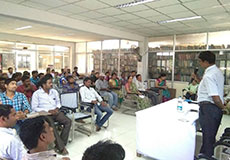
Under the Integrated Digital Library Programme (IDLP), DEF is implementing a multi-stakeholder effort to rejuvenate and transform public libraries into inclusive knowledge and information centres catering to the needs of communities. In April, DEF organised various activities such as orientation programmes for librarians and library staff and career counseling in seven central, regional and district libraries. A total of 510 beneficiaries participated in these activities. Meanwhile, DEF also donated five computers to Sangareddy district library in Telangana, a state where DEF has been assigned the task of digitally transforming all district libraries.

In an effort to support enhancement of learning and teaching experiences in government schools under project Raised — Raising Standards of Education & Going Digital — DEF has supported 10 government primary schools in Gautam Buddha Nagar district of Uttar Pradesh with physical infrastructure such as windows for classrooms and 425 school desks. Raised is implemented by DEF in partnership with Capgemini to introduce digital literacy in schools, build capacity of teachers to strengthen management and ensure compliance with the Right to Education Act. The aim is to create repllicable model schools.


CIRC Khandela in Rajasthan is building a small children’s library within the centre to provide children with resources to read and inculcate a habit of reading. The team believes that reading is an important habit that needs to be developed at a young age, as it improves vocabulary, allows room for imagination and aids children in their education —traditional, alternative and digital. Students visiting the centre can now pick their favourite book from the shelf and spend some time reading it with their peers after their digital literacy lesson for the day is over. Interactions post reading sessions will also facilitate quality dialogue between children.

CIRC Mankara in Kerala organised an awareness programme on reproductive and child health care last month. The session aimed at creating awareness about right nutritional practices among pregnant women and young mothers. Women were educated on how child nutrition is as important as maternal nutrition. Community members, panchayat representatives, officials from the Integrated Child Development Services (a social welfare scheme to tackle malnutrition in children, pregnant women and nursing mothers) and ASHA workers addressed women’s questions on health and hygiene, and shared tips on child’s health care.
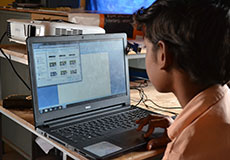
Last month, a team from the Musiri handloom cluster in Tamil Nadu, which has been adopted by DEF and Mphasis under the former’s Digital Cluster Development Programme to digitally empower the weavers in the region, carried out a massive mobilisation drive to make community members aware of the summer courses that will be offered at their CIRCs in Trichy district. This effort brought a significant change in the enrollment number, leading to the joining of 118 students. Meanwhile, the Musiri cluster has adopted two government middle schools to provide digital literacy to students, teachers and headmasters. Read More

Recognising that digital literacy should not be restricted to only a few, CIRC Tura in Meghalaya team visited the Monfort School of Physically Disabled last month to mobilise teachers and students to access the various services available at the centre. Most of the teachers at the school are blind, and also expressed the desire to receive special training in digital literacy. This is an important step towards social inclusion for DEF, and it aims to skill differently-abled peopl through a speciallyy-designed curriculum to reduce the stigma attached to them. The teachers are excited at the prospect of learning computers soon.

A special programme was held in West Champaran, Bihar, to celebrate 100 years of the Champaran Satyagraha. DEF’s women beneficiaries under Google’s Internet Saathi project also participated in this event where Gandhian and Founder of the National Youth Project Dr. SN Subbarao pointed out that development can only happen when rural communities are empowered through projects like the Internet Saathi. The Champaran Satyagraha of 1917 was the first intersection of peasant unrest (oppression of Champaran’s indigo farmers by white planters dated back to the 19th century). Gandhi’s first satyagraha established his repute in Indian politics.


#HumansOfSaidanpur is trying to share simple stories of everyday life from Saidanpur village in Uttar Pradesh through Baank-e-Loom’s Facebook, Twitter and Instagram pages. The inspired hashtag is an effort to make people aware of India’s rural culture and connect people from urban spaces to rural stories. Baank-e-Loom is a project initiated by DEF in partnership with Ericsson, under the former’s Digital Cluster Development Programme, to digitally empower the weavers and youth of Barabanki district and increase their livelihood. Meanwhile, it’s been a season of trainings for Baank-e-loom stakeholder. Read More
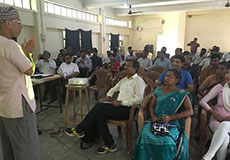
A one-day ICT capacity building workshop was organised in Ranchi, Jharkhand, on April 9, 2017, to make local NGOs comfortable in using Google applications and other digital tools that are available for Indian non-profits to improvise their operations and management. Around 52 NGOs participated in the workshop that focused on Google for Non Profits (G4NP) for easy fundraising and effective collaboration; content creation in regional languages for wider reach; importance of Internet safety for secure operation; and social media for enhanced networking. Towards the end of the workshop, 17 NGOs decided to go online. Read More


On the 126th birth anniversary of BR Ambedkar, several CIRCs across India shared with DEF head office what Ambedkar idealogy or thought resonates best with them. Throughout the day on April 14, 2017, photographs came in from various parts of the country, with men, women and children holding their favourite quote of social reformer BR Ambedkar. On the occasion, CIRC Nichlagarh in Rajasthan even organised a rally, led by school students and followed by community members, to commemorate Ambedkar’s life and raise awareness about his role in drafting the Constitution. The rally helped people understand their Fundamental Rights.
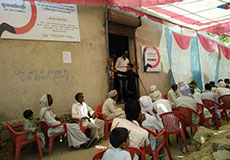
DEF inaugurated a new Soochna Seva Kendra under its SoochnaPreneur model in Alwar, Rajasthan, on April 18, 2017, in the presence of 150 community members and local partner Ibtada. This SSK is a joint initiative of DEF and Qualcomm to create information entrepreneurs. The centre will function as a hub to offer dynamic digital services, access to schemes, entitlements and employment opportunities suitable for community members, especially youth. The impetus behind the digitally well-equipped centre is to connect marginalised sections of the society to public welfare schemes or entitlements and improve their living standards.

DEF and the office of the Delegation of the European Union in India organised a panel discussion on ‘Strengthening Governance and Citizen Engagement Digitally for Last Mile Access and Delivery of Public Schemes Information and Entitlements’ in Ranchi, Jharkhand, on April 24, 2017. The consultation, led by the Soochna Seva team, was aimed at identifying innovations and best practices in the area of access and delivery of information and entitlements. The discussion sought to strengthen the efforts of the government and other stakeholders to democratise and decentralise access to information, citizen entitlement and service delivery.


Software Freedom Law Centre (SFLC) in association with DEF, the Internet Democracy Project, IT for Change, the Centre for Internet and Society, and the Foundation for Media Professionals organised a public discussion on ‘Access Denied: Internet Shutdowns in a Digital India’ at Hauz Khas Social, New Delhi, on April 24, 2017. The discussion aimed at creating a platform for various stakeholders to come together to share their views on the increasing instances of Internet shutdowns in an India that’s rapidly moving towards Digital India. The event saw participants from the industry, civil society, government and media. Read More

DEF successfully completed two digital security and digital literacy trainings for 50 Indian Council of Historical Research (ICHR) staffers from April 24 - 27, 2017. With the overarching objective of creating awareness regarding keeping oneself safe in today's increasingly digital lives, the first-of-its-kind capacity building initiative by DEF blended basic digital literacy aspects as well as digital security for the staff at ICHR. The hands-on content of training emphasised on prevention as an approach to protection and, hence, focused on topics that included creating strong passwords, using internationally tested and recommended software and antivirus programmes.





RBS Foundation India

House No. 44, 3rd Floor, Kalu Sarai, New Delhi | def@defindia.net | www.defindia.org | +91-11-26532786


